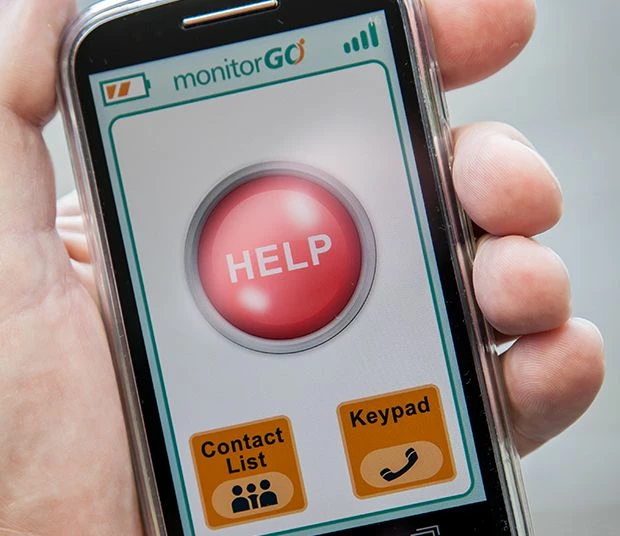
Partner Article
The new elderly alarm device, invented because of failings in pendant alarm systems
A device that detects a Fall? Alerts to Unconsciousness? Tracks location? A new innovation that has all these features has been developed by Huddersfield entrepreneur and former head teacher, Stephen Bradbury. His inspiration was his uncle. In his 90s, John was frail and prone to falls but fiercely independent and determined to stay in his own home. He used a pendant alarm but it proved to be of little use. If he was in his garden, or wanted to post a letter, he would be out of range of the landline. Yet when he crashed unconscious onto his kitchen floor, he lay there for hours, unable to raise the alarm.
Stephen knew there had to be something better.
The result is MonitorGO - a personal alarm device that uses smart phone technology to do all the things that a pendant alarm cannot do, plus quite a few extras that no elderly alarm has ever done before. It has the potential to help older people stay in their home for much longer which is not only of benefit to the users and their families but reduces the strain on the health service. As the population becomes an increasingly aged one (life expectancy for women has increased from 85 to 89 in the last 10 years) aids like this will become increasingly important in the management of elderly care.
Why is MonitorGO different? Like a pendant alarm, it can call for help but it differs in lots of ways: it’s not restricted to a landline so it will work anywhere with a mobile signal; it can detect a fall and it can raise the alarm for you, even if you are unconscious; it can detect if you have become unconscious without the impact of a fall and it will call for help; and it can track your location which can be useful if you wander off and become confused, or just for getting help to you if you’ve had a fall outside the home. It’s also still a mobile phone so you can use it to make and receive calls as you would normally.
Stephen spoke of his search for a better alarm device for John
“The pendant alarm was no good for John as the falls he had were usually caused by him becoming unconscious so he was unable to trigger the alarm. Once he fell in a ditch by the roadside and could not move – while he was able to press the button he was out of range of the box on the landline so once again, it didn’t work for him. He would say ’I’m all right Stephen’ but he wasn’t all right so I knew we needed to find a better solution.
There was no better alternative in the UK so we searched overseas and while we found systems that were better than what we had, nothing really ticked all the boxes. I studied the technology in mobile phones and realised that they could be used to measure the distance and impact of falls, and it all started from there.“
The device has been in development for over 12 months and was launched to the public at the end of October. Already it has attracted the attention of former Dragon, Theo Paphitis (from the BBC’s Dragons Den), who chose it as an #SBS winner on 9th November.
It’s sadly too late for John, who passed away in 2012, but the potential difference it can make to older people who want to remain independent and stay in their own home is huge.
This was posted in Bdaily's Members' News section by Sarah Ainslie .
Enjoy the read? Get Bdaily delivered.
Sign up to receive our popular Yorkshire & The Humber morning email for free.








 £100,000 milestone drives forward STEM work
£100,000 milestone drives forward STEM work
 Restoring confidence for the economic road ahead
Restoring confidence for the economic road ahead
 Ready to scale? Buy-and-build offers opportunity
Ready to scale? Buy-and-build offers opportunity
 When will our regional economy grow?
When will our regional economy grow?
 Creating a thriving North East construction sector
Creating a thriving North East construction sector
 Why investors are still backing the North East
Why investors are still backing the North East
 Time to stop risking Britain’s family businesses
Time to stop risking Britain’s family businesses
 A year of growth, collaboration and impact
A year of growth, collaboration and impact
 2000 reasons for North East business positivity
2000 reasons for North East business positivity
 How to make your growth strategy deliver in 2026
How to make your growth strategy deliver in 2026
 Powering a new wave of regional screen indies
Powering a new wave of regional screen indies
 A new year and a new outlook for property scene
A new year and a new outlook for property scene